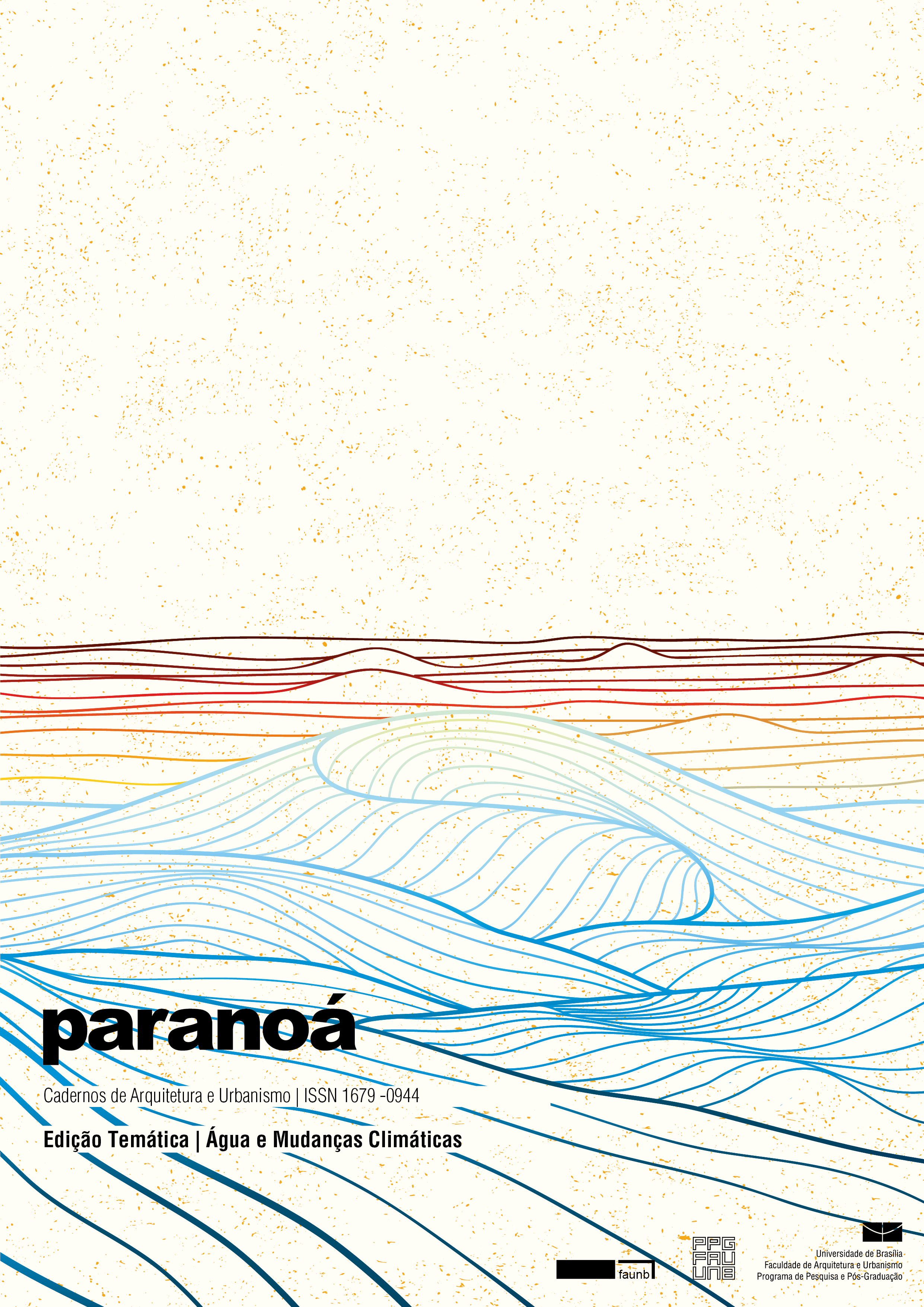Study of the technical and economic feasibility of using rainwater in a public building in the urban zone of Recife – PE
DOI:
https://doi.org/10.18830/issn.1679-0944.n34.2023.27Keywords:
Águas Pluviais, Qualidade Da Água, Sustentabilidade, Potável, Inovação, Zona UrbanaAbstract
The water provision for human use has become a challenge all around the word, once the pressure on water resources has caused a real competition for solutions that can supply this demand. Having the purpose to solve these questions, the rainwater has been seen as a prospective substitute for traditional means. Therefore, the present project aims to conduce a viability study, in qualitative, technical, and financial terms about the construction of a rainwater system in a public building located in Recife-PE. To realize the proposed objectives, a pilot system for collecting and cleaning rainwater was developed, using a first water discard device, named DesviUFPE. A technical and economic feasibility study about the expansion of the system was realized, aiming fully supply the building water demand. In technical terms the purposed system proved to be highly feasible, fully supplying demand in half the months of the year and more than 50% in shortage periods. The economic advantages are expressive to, saving up to 80% in water tariff costs, plus a payback time of four and a half years.
Downloads
References
ALVES, F., KÖCHLING, T., LUZ, J., SANTOS, S.M., GAVAZZA, S. Water quality and microbial diversity in cisterns from semiarid areas in Brazil. J. Water Health 12 (3), 513 e 525, 2014.
APHA, 2005. Standard Methods for the Examination of Water and Wastewater, 21th ed. American Publishers Health Association, Washington DC, USA.
BRASIL. Ministério da Saúde. Gabinete do Ministro. Portaria de Consolidação nº 5, de 28 de setembro de 2017. Brasília, 2017.
BRASIL. Senado Federal. Projeto de Lei do Senado Nº 252, de 2014. Dispõe sobre a adoção de práticas de construção sustentável. Brasília: Senado Federal, 2014. Disponível em: <https://www25.senado.leg.br/web/atividade/materias/-/materia/118455>. Acesso em: 27 abr. 2021.
CAIXA ECONÔMICA FEDERAL. SINAPI – Referências de Preços e Custos. Brasília, 2021 Disponível em: <https://www.caixa.gov.br/site/Paginas/downloads> Acesso em: 05 dez. 2021.
CAMPISANO, A., BUTLER, D., WARD, S., BURNS, M. J., FRIEDLER, E., DEBUSK, K., FISHER-JEFFES, L. N., GHISI, E., RAHMAN, A., FURUMAI, H. AND HAN, M. Urban rainwater harvesting systems: Research, implementation and future perspectives, Water Research, v. 115, p. 195-209, mai. 2017.
CARVALHO, J. R. S.; LUZ, J.; SANTOS, S. M.; GAVAZZA, S. A PVC-pipe device as a sanitary barrier for improving rainwater quality for drinking purposes in the Brazilian semiarid region. Journal of Water and Health, v. 16, p. 391-402, jun. 2018.
DWIVEDI, A. K. Researches In Water Pollution: A Review. International Research Journal of Natural and Applied Sciences, v. 4, n. 1, p. 2349-4077, jan. 2017.
INIMET. Instituto Nacional de Meteorologia. Banco de Dados Meteorológicos do INMET, 2021. Disponível em: <https://bdmep.inmet.gov.br/>. Acesso em: 20 nov. 2021.
JAMAL, S. I. M.; AHMED, S.; AKTER, S.; NAHAR, A.; SULTANA, R.; UDDIN, M. R.; JAHAN, T.; SULTANA, S.; HASAN, M. Spatial Variation of Rainwater Quality Parameters at Khulna City of Bangladesh. Journal of Environment Pollution and Human Health, v. 8, n. 2, p. 49-54, 2020.
LIMA, J. C. A. L. Avaliação do desempenho de dispositivo de desvio das primeiras águas de chuva utilizado em cisternas no semiárido pernambucano. Dissertação de Mestrado – Engenharia Civil, Universidade Federal de Pernambuco, Recife-PE, 101 p. 2012.
MENDES, M. E.; FAGUNDES, C. C.; PORTO, C. C.; BENTO, L. C.; COSTA, T. G. R.; SANTOS, R. A.; SUMITA, N. M. A importância da qualidade da água reagente no laboratório clínico. Bras Patol Med Lab, v. 47, n. 3, p. 217-223, jun. 2011.
NABULSI, R.; AL-ABBADI, M. A. Review of The Impact of Water Quality on Reliable Laboratory Testing and Correlation with Purification Techniques. Lab Medicine, v. 45, n. 4, p. e159 – e165, nov. 2014.
NAÇÕES UNIDAS. 2015. United Nations Transforming our World: The 2030 Agenda for Sustainable Development. New York: United Nations. A/RES/70/1. Disponível em: < https://sustainabledevelopment.un.org/post2015/transformingourworld/publication>. Acesso em: 16 dez. 2021.
OLAOYE, R. A; OLANIYAN, O. S. Quality of Rainwater from Different Roof Material. International Journal of Engineering and Technology, v. 2, n. 8, p. 1413-1421, ago. 2012.
OMS/UNICEF. 1 em cada 3 pessoas no mundo não tem acesso a água potável, dizem o UNICEF e a OMS. UNICEF BRASIL, Brasília, 18 jun. 2019. Disponível em: <https://www.unicef.org/brazil/comunicados-de-imprensa/1-em-cada-3-pessoas-no-mundo-nao-tem-acesso-agua-potavel-dizem-unicef-oms>. Acesso em: 29 abr. 2021.
RIBEIRO, A. K. M.; MARINOSKI, D. L. Estudo sobre materiais para coberturas utilizadas em sistemas de aproveitamento de água pluvial residenciais. Mix Sustentável, Florianópolis, v. 6, n. 2, p. 53-66, mai. 2020.
THOMAS, E. O.; KOUAME, K. J. M. B. Assessment of Quality of Rainwater Harvested from Roof Tops in Ikotun Area of Lagos State. Global Scientific Journals, v 7, n. 12, p. 1480 – 1499, dez. 2019.
ZDEB, M. ZAMORSKA, J. PAPCIAK D. SŁYŚ D. The Quality of Rainwater Collected from Roofs and the Possibility of Its Economic Use. Resources, v. 9, n. 12, p. 1-20, jan. 2020
Downloads
Published
How to Cite
Issue
Section
License
Copyright (c) 2023 Paranoá

This work is licensed under a Creative Commons Attribution 4.0 International License.
Autores que publicam nesta revista concordam com os seguintes termos:
- Autores mantém os direitos autorais e concedem à revista o direito de primeira publicação, com o trabalho simultaneamente licenciado sob a Licença Creative Commons Attribution que permite o compartilhamento do trabalho com reconhecimento da autoria e publicação inicial nesta revista. http://creativecommons.org/licenses/by/4.0
- Autores têm autorização para assumir contratos adicionais separadamente, para distribuição não-exclusiva da versão do trabalho publicada nesta revista (ex.: publicar em repositório institucional ou como capítulo de livro), com reconhecimento de autoria e publicação inicial nesta revista.
- Autores têm permissão e são estimulados a publicar e distribuir seu trabalho online (ex.: em repositórios institucionais ou na sua página pessoal) a qualquer ponto antes ou durante o processo editorial, já que isso pode gerar alterações produtivas, bem como aumentar o impacto e a citação do trabalho publicado (Veja O Efeito do Acesso Livre).















